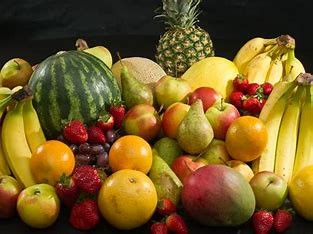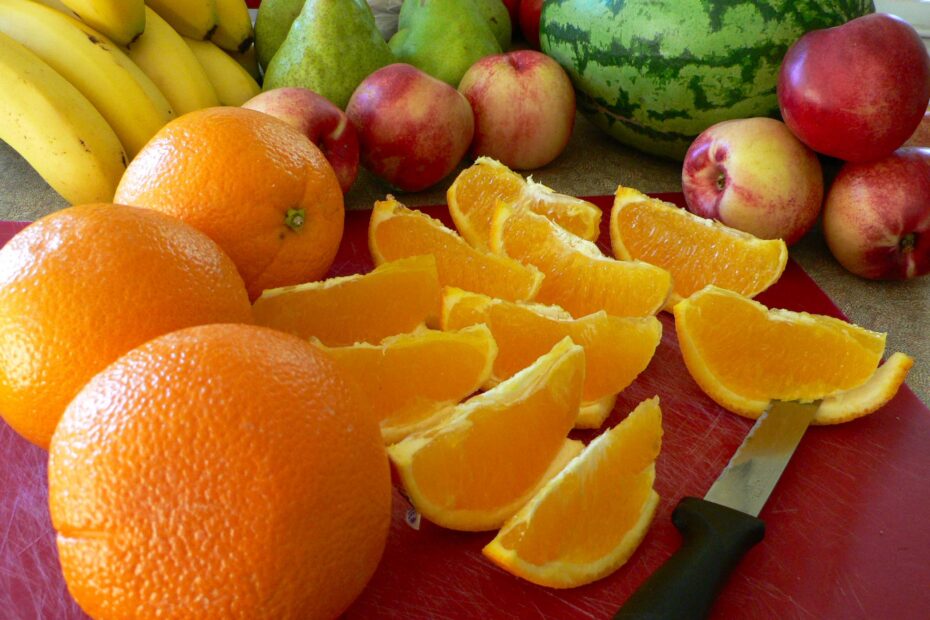People are becoming increasingly aware of the importance of their health and well-being.
As a result, they are constantly seeking new ways to improve their lifestyles and boost their overall wellness.
One such trend that has gained significant popularity is the consumption of fermented fruits.
Fermentation is not a new concept; it has been practiced for thousands of years across various cultures around the world.
However, its benefits have only recently started to gain recognition.
Fermented fruits offer a plethora of advantages, from improving digestion to boosting the immune system.
In this article, we will explore the power of fermented fruits as a healthy life hack and how you can incorporate them into your daily diet.
The Rise of Fermented Fruits
The process of fermenting fruits dates back centuries and has played a crucial role in many civilizations.
The ancient Egyptians, Greeks, and Romans all recognized the value of fermentation in preserving food and enhancing its nutritional profile.
They understood that by allowing fruits to undergo natural fermentation, they could unlock their hidden potential and make them even more beneficial for human consumption.
Not only did fermentation help extend the shelf life of fruits, but it also made them easier to digest and provided an array of health benefits.
These early civilizations may not have fully understood the science behind fermentation, but they certainly appreciated its impact on their well-being.
The Science Behind Fermentation

Fermentation is a natural process that occurs when microorganisms, such as bacteria or yeast, convert sugars into alcohol or acids.
In the case of fruit fermentation, the sugars in the fruit are broken down by these microorganisms, resulting in the production of alcohol, carbon dioxide, and various organic acids.
These byproducts of fermentation not only give fermented fruits their unique flavors and textures but also contribute to their health benefits.
The organic acids produced during fermentation, such as lactic acid and acetic acid, have been shown to have antimicrobial properties and can help improve digestion.
Furthermore, fermentation can increase the bioavailability of certain nutrients in fruits.
For example, the fermentation of cabbage to make sauerkraut increases the levels of vitamin C and other antioxidants.
Similarly, fermenting grapes to make wine can enhance the levels of resveratrol, a compound known for its potential health benefits.
It is important to note that not all fermented fruits are created equal.
The health benefits of fermented fruits can vary depending on the specific fruit, the fermentation process used, and the presence of other ingredients or additives.
The Health Benefits of Fermented Fruits

Fermented fruits offer a range of health benefits that can contribute to overall well-being.
Some of the key benefits include:
- Improved Digestion: The organic acids produced during fermentation can help improve digestion by promoting the growth of beneficial gut bacteria and aiding in the breakdown of food
- Enhanced Nutrient Absorption: Fermentation can increase the bioavailability of certain nutrients, making them easier for the body to absorb and utilize
- Boosted Immune System: The probiotics produced during fermentation can help support a healthy immune system by promoting the growth of beneficial bacteria in the gut
- Reduced Inflammation: Fermented fruits contain anti-inflammatory compounds that can help reduce inflammation in the body and support overall health
- Improved Mental Health: The gut-brain connection is well-established, and consuming fermented fruits can help support a healthy gut microbiome, which in turn can positively impact mental health
It is worth noting that, while fermented fruits can be a healthy addition to a balanced diet, they should be consumed in moderation.
Some fermented fruits, such as those used to make alcoholic beverages, can be high in sugar and calories.
Additionally, individuals with certain health conditions, such as yeast overgrowth or histamine intolerance, may need to limit their consumption of fermented fruits.
In conclusion, the rich history of fermenting fruits spans across civilizations and has had a significant impact on health.
However, it is important to consume fermented fruits in moderation and consider individual health conditions.
The Process Explained: How to Ferment Fruits at Home

Fermenting fruits at home is a simple and rewarding process.
All you need are some fresh fruits, water, sugar, and a little bit of patience.
Here’s a step-by-step guide:
Step 1: Select Ripe and Organic Fruits
Select ripe and preferably organic fruits.
Step 2: Wash the Fruits
Wash the fruits thoroughly to remove any dirt or pesticides.
Step 3: Chop or Crush the Fruits
Chop the fruits into small pieces or crush them to release their juices.
Step 4: Place the Fruit in a Glass Jar
Place the fruit in a clean glass jar, leaving some space at the top for expansion.
Step 5: Dissolve Sugar in Water
Dissolve sugar in water (approximately 1-2 tablespoons per cup of water) and pour it over the fruit until it is completely submerged.
Step 6: Cover the Jar
Cover the jar with a breathable cloth or coffee filter to allow air circulation while keeping out insects and dust.
Step 7: Store in a Cool, Dark Place
Store the jar in a cool, dark place away from direct sunlight.
Step 8: Let it Ferment
Let the mixture ferment for about 3-7 days, depending on your desired taste and texture.
Step 9: Strain and Transfer
Once fermented, strain the liquid and transfer it to a new container.
Step 10: Refrigerate
Refrigerate the fermented juice to slow down further fermentation.
Remember, the process may vary slightly depending on the type of fruit you are fermenting, so be sure to follow specific recipes and guidelines for the best results.
Deciphering the Nutritional Value of Fermented Fruits
Fermentation has a profound effect on the nutritional value of fruits.
It not only enhances their existing nutrients but also introduces beneficial compounds that are not present in fresh fruits.
Here’s what happens during the fermentation process:
Increased Bioavailability
Fermentation breaks down complex carbohydrates and proteins into simpler forms, making them easier for our bodies to absorb and utilize.
This means that the valuable vitamins, minerals, and antioxidants present in fruits become more accessible to our systems.
Enriched Vitamin Content
Fermented fruits often contain higher levels of certain vitamins compared to their fresh counterparts.
For example, the fermentation of citrus fruits can significantly increase their vitamin C content, which is essential for immune function and collagen production.
Enhanced Antioxidant Activity
Antioxidants play a crucial role in protecting our cells from damage caused by free radicals.
Fermentation increases the antioxidant activity in fruits, making them even more effective in combating oxidative stress and reducing the risk of chronic diseases.
Gut-Friendly Fiber
Fermented fruits are a great source of dietary fiber, which is essential for maintaining a healthy gut microbiome.
The fermentation process breaks down complex fibers into more easily digestible forms, promoting better digestion and regular bowel movements.
Other Health Benefits of Fermented Fruits

Fermented fruits are teeming with beneficial bacteria known as probiotics.
Weight management
Some studies indicate that probiotics can aid in weight loss and prevent obesity.
They may increase feelings of fullness, regulate appetite hormones, and improve insulin sensitivity.
Lower cholesterol levels
Certain strains of probiotics found in fermented fruits have been shown to reduce LDL (bad) cholesterol levels, thus lowering the risk of cardiovascular diseases.
Enhanced skin health
The gut-skin axis highlights the relationship between gut health and skin conditions.
Probiotics can help alleviate acne, eczema, and other inflammatory skin conditions by balancing the gut microbiome.
Enhance Your Gut Health: How Fermented Fruits Aid Digestion
A healthy gut is crucial for overall well-being, as it plays a significant role in digestion, nutrient absorption, and immune function.
Fermented fruits are an excellent way to support your gut health and optimize your digestive system.
Here’s how they aid digestion:
Restoring gut flora balance
The natural fermentation process introduces beneficial bacteria into our gut, helping to restore the delicate balance of microorganisms.
This balance is essential for optimal digestion and nutrient absorption.
Alleviating bloating and gas
Fermented fruits contain enzymes that break down complex carbohydrates and fibers, reducing the likelihood of bloating and excessive gas production.
They also promote regular bowel movements, preventing constipation.
Boosting enzyme activity
Enzymes play a vital role in breaking down food particles, making them easier to digest.
Fermentation increases enzyme activity in fruits, aiding in the breakdown of proteins, fats, and carbohydrates.
Increasing nutrient availability
Fermented fruits enhance the bioavailability of nutrients, ensuring that your body can absorb and utilize them effectively.
This means you get more nutritional value from the foods you eat.
Strengthening the intestinal barrier
A healthy gut lining acts as a protective barrier against harmful substances and pathogens.
The probiotics present in fermented fruits help strengthen this barrier, reducing the risk of leaky gut syndrome and related digestive issues.
Immune System and Overall Wellness: The Protective Role of Fermented Fruits
Maintaining a robust immune system is essential for staying healthy and warding off illnesses.
Fermented fruits can be a powerful ally in boosting your immunity and promoting overall wellness.
Here’s why:
Probiotics for immune defense
The probiotics in fermented fruits stimulate the production of antibodies and enhance the activity of immune cells, such as natural killer (NK) cells and T-cells.
This strengthens your body’s ability to fight off infections.
Reduced risk of respiratory infections
Regular consumption of fermented fruits has been associated with a lower incidence of respiratory infections, including the common cold and flu.
This is attributed to the immune-boosting properties of probiotics.
Allergy prevention
Imbalances in gut bacteria have been linked to an increased risk of allergies.
By promoting a healthy gut microbiome, fermented fruits can help reduce the likelihood of developing allergic reactions.
Anti-microbial effects
Some strains of probiotics found in fermented fruits produce antimicrobial substances that inhibit the growth of harmful bacteria and viruses.
This further protects against infections and supports overall immune function.
Shorter duration of illness
If you do happen to fall ill, consuming fermented fruits can potentially shorten the duration and severity of the illness.
The immune-boosting properties of probiotics may help your body recover quickly.
When incorporating fermented fruits into your diet, it’s important to choose high-quality, organic options.
Look for products that are free from added sugars and artificial preservatives.
You can enjoy fermented fruits on their own, as a topping for yoghurt or oatmeal, or as an ingredient in smoothies and salads.
Remember to start slowly when introducing fermented foods to your diet, as they can be rich in beneficial bacteria that may cause temporary digestive discomfort in some individuals.
Gradually increase your intake over time to allow your body to adjust.
Common Myths and Misconceptions about Fermented Foods Debunked
As with any health trend, there are bound to be myths and misconceptions surrounding fermented foods.
Let’s debunk some common ones:
Myth: Fermented fruits are high in sugar.
Fact: The fermentation process reduces the sugar content of fruits, making them a healthier option compared to their fresh counterparts.
Myth: All fermented foods taste sour or unpleasant.
Fact: While some fermented foods have tangy flavors, others can be sweet, savory, or even spicy.
There are a wide variety of fermented fruits to suit every palate.
Myth: Fermented fruits lose all their nutrients during fermentation.
Fact: Fermentation actually enhances the nutrient content of fruits by increasing bioavailability and introducing beneficial compounds.
Myth: You need fancy equipment and specialized knowledge to ferment fruits at home.
Fact: Fermenting fruits can be as simple as using a glass jar and some basic ingredients.
There are plenty of resources available online to guide you through the process.
Anecdote to a Healthy Life: Personal Success Stories of Fermented Fruit Consumption
Sarah, 35
Since I started drinking homemade fermented fruit juice every morning, my digestion has improved significantly. I no longer suffer from bloating or indigestion, and I feel more energized throughout the day.
Mark, 42
I used to catch every cold that went around the office. Ever since I started eating fermented fruits regularly, my immune system feels stronger than ever. I haven’t had a single sick day in months!
Emily, 28
As someone with sensitive skin, I struggled with acne for years. Adding fermented fruits to my diet has made a noticeable difference in my complexion. My skin looks clearer and healthier overall.
Mike, 50
I’ve always struggled with maintaining a healthy weight. Since I started incorporating fermented fruits into my meals, I’ve noticed a decrease in cravings and an easier time managing my portion sizes. It’s been a game-changer for me.
Fermented fruits have been shown to improve digestion, boost the immune system, enhance skin health, and aid in weight management.
These personal anecdotes highlight the transformative power of fermented fruits and how they can positively impact various aspects of our health and well-being.
How to Incorporate Fermented Fruits into Your Diet
There are several ways to incorporate fermented fruits into your diet:
- Drink homemade fermented fruit juice or smoothies
- Add fermented fruits to your breakfast cereal or yoghurt
- Use fermented fruits as a topping for salads or desserts
- Enjoy fermented fruit preserves or chutneys with your meals
It’s important to note that not all fermented fruits are created equal.
Look for products that are made with natural ingredients and do not contain added sugars or artificial preservatives.
Conclusion
In conclusion, fermented fruits offer a multitude of health benefits that can greatly improve your overall wellness.
From aiding digestion and boosting the immune system to promoting mental well-being and enhancing skin health, the power of fermentation is truly remarkable.
Benefits of Fermented Fruits
By incorporating fermented fruits into your daily diet, you can harness the potential of these probiotic powerhouses and take a significant step towards a healthier, more vibrant life.
So why wait?
Start experimenting with fermentation today and unlocking the incredible benefits that fermented fruits have to offer.
Fermented fruits aid digestion by promoting the growth of beneficial bacteria in the gut.
They boost the immune system by increasing the production of antibodies and enhancing the activity of immune cells.
Fermented fruits promote mental well-being by improving the production of neurotransmitters like serotonin, which can help regulate mood and reduce symptoms of depression and anxiety.
They enhance skin health by increasing the production of collagen, a protein that helps maintain the elasticity and firmness of the skin.
Consider making your own fermented fruits at home using simple ingredients like fruit, water, and salt. This allows you to control the fermentation process and customize the flavors to your liking.
Remember to always consult with a healthcare professional or nutritionist before making significant changes to your diet, especially if you have any underlying health conditions.
FAQs About Fermented Fruits
Q: Can I ferment any type of fruit?
A: Most fruits can be fermented, but some may yield better results than others due to their sugar content and acidity levels. Experimentation is key!
Q: How long does it take for fruits to ferment?
A: The fermentation time varies depending on factors such as temperature, fruit type, and desired taste. Generally, it takes anywhere from 3-7 days.
Q: Are there any risks associated with fermenting fruits at home?
A: When done correctly, fermenting fruits at home is safe.
However, it’s essential to maintain proper hygiene and follow recommended guidelines to prevent contamination.
Q: Can I consume too much fermented fruit?
A: While fermented fruits are generally safe for consumption, it’s best to start with small amounts and gradually increase your intake. Listen to your body and adjust accordingly.
Q: Where can I find fermented fruits if I don’t want to make them myself?
A: Many health food stores and specialty grocery stores now carry a variety of fermented fruits.
Look for brands that prioritize quality and use organic ingredients.

